"Pastoral Societies in Africa: New Possibilities for Sustainable Development through the Interaction of Scientific Researchers and Development Workers"
Date: September 4,(Thu) 2008
Venue: University of Nairobi, Kenya
Pastoral Societies in Africa:
New Possibilities for Sustainable Development through the Interaction of Scientific Researchers and Development Workers
Co-hosting Organizers:
・Institute of African Studies, University of Nairobi
・Japan Society for the Promotion of Science (JSPS), Nairobi Research Station
・Center for African Area Studies, Kyoto University




【Summary】
The Nairobi Research Station of the Japan Society for the Promotion of Science (JSPS), the Institute of African Studies of Nairobi University, and the Center for African Area Studies of Kyoto University will hold an international workshop in Nairobi, the capital of Kenya, in September 2008. The workshop will address new possibilities for the sustainable development of African pastoral societies by promoting communication, discussion, and cooperation among researchers and development workers from both Japan and worldwide who have worked among pastoral societies in Africa.
African pastoralists experienced sweeping natural and socioeconomic changes in the 20th century. The increasing frequency of drought, loss of access to natural resources, politico-economic marginalization in both the colonial era and post independence, ethnic conflicts and insecurity, and large-scale international and national development projects have all had a heavy impact on pastoralists. However, with the expansion of globalization, communications technology, and increasing interaction between pastoralists and development agencies, more pastoralists are beginning to understand their situation in a larger context and to communicate their problems and views to national governments and development agencies. Among the problems for pastoralist societies are poverty, economic discrimination, insecurity, and a lack of access to political decision making, education, and public services.
In conjunction with these trends, the United Nations Office for the Coordination of Humanitarian Affairs and the African Union Inter-African Bureau for Animal Resources and Department of Rural Economy and Agriculture launched the "Pastoral Policy Framework Initiative" in 2007. This initiative aims to produce tangible results supporting sustainable economic development of pastoral communities. International conferences were held at Isiolo in July 2007 and Nairobi in April 2008.
Japanese researchers have ascertained the subsistence fundamentals of African pastoral societies, which include access to and distribution of ecological and sociological resources, livelihood strategies maintained by indigenous knowledge and local practices, resource use and management conventions, socioeconomic systems centered on reciprocal help activities, and a flexible attitude toward disasters. Cultural and social researchers have examined disease coping mechanisms and the noble representations of pastoralists about their own cultures. In all, this research suggests that development projects tend to fail because of shortsighted and biased development initiatives that fail to understand that pastoralists adapt flexibly to the natural environment; instead, these projects concentrate solely on economic and technical aspects, without considering the socio-cultural values and practices of pastoral societies.
The September workshop will focus on local practices, as recorded over many years of anthropological fieldwork, and will be consultative and highly participatory between researchers and development affairs professionals. The objective is to address critical issues facing pastoral communities and determine workable solutions that can shape sustainable development. The ultimate goal is to move toward more holistic and effective development policies, based on local practices, for African pastoralism.
Presentations:
(1) Itaru Ohta(Professor, ASAFAS, Kyoto University)
(2) Itsuhiro Hazama(Resident Director, Japan Society for the Promotion of Science, Nairobi Research Station)
(3) SUN Xiaogang(G-COE Researcher, CSEAS, Kyoto University)
(4) Ali Wario (UN-OCHA, African Pastoral Policy Framework Specialist)
(5) Kennedy Agade Mkutu (Lectures, Kenya Institute for Administration)
(6) Dr. Zeremariam Fre (Senior Lecturer, University College London)
Commentators:
(1) Isaac Nyamongo (Director of Institute of African Studies, University of Nairobi)
(2) Shinya Konaka (Associate Professor, University of Shizuoka)

